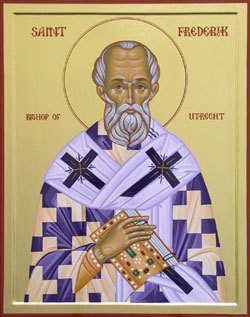|
Συναξαριστής |
31 Ιουλίου όνομα: ΦΡΕΙΔΕΡΙΚΟΣ (Φρειδερίκος) |
 |
| ΑΓΙΟΣ ΦΡΕΙΔΕΡΙΚΟΣ Επίσκοπος Ουτρέχτης (Bishop of Utrecht) Σημείωση : Ο Αγιος Φρειδερίκος δεν έχει περιληφθεί στο Ελληνικό Ορθόδοξο εορτολόγιο. Επειδή όμως υπάρχει στο Εορτολόγιο της Ρωσσικής Ορθόδοξης Εκκλησίας, μπορεί να εορταστεί ως Ορθόδοξος Αγιος. Martyr Frederick was trained in piety and sacred learning among the clergy of the Church of Utrecht. Being ordained priest, he was charged by Bishop Ricfried with the care of instructing converts, and about 825 he was chosen to succeed him as bishop of Utrecht. The new bishop at once began to establish order everywhere, and sent St. Odulf and other zealous and virtuous labourers into the northern parts to dispel the paganism which still subsisted there. According to tradition St. Frederick became involved in the difficulties between the sons of the emperor, Louis the Debonair, and their father and step-mother. During these disturbances the party of the young princes charged the Empress Judith with numerous immoralities. Whatever may have been the truth of these stories, St. Frederick is said to have admonished her of them, with charity but with the effect of drawing upon himself the fury and resentment of the empress. He also got himself disliked elsewhere. The inhabitants of Walcheren were barbarous and most averse from the Gospel. On which account, St. Frederick, when he sent priests in the northern part of his diocese, took this most dangerous and difficult part chiefly to himself; and nothing gave him more trouble than marriages contracted within the forbidden decrees and the separation of the parties (that the union of Louis and Judith was itself incestuous was an afterthought of hagiographers). The story goes on that, on July 18, 838, after St. Frederick had celebrated Mass and was about to make his thanksgiving, he was stabbed by two assassins. He died in a few minutes, reciting that verse of Psalm 144, "I will praise the Lord in the land of the living". The eleventh century author of his life says that these assassins were employed by the Empress Judith, who could not pardon the liberty he had taken to reprove her sins, and was incited thereto by her husband. William of Malmesbury and others repeat the same; but later writers, such as Baronius and Mabillon, think that they were rather sent by some of the inhabitants of Walcheren. And this seems the more likely opinion: for no contemporary makes the charge against Judith and it is not at all in consonance with the attitude of Louis towards episcopal authority and Christian conduct. St. Frederick composed a prayer to the Blessed Trinity which for many ages was used in the Netherlands. The reputation of his sanctity appears from a poem of Rabanus Maurus, his contemporary, in praise of his virtues. from Wikipedia Frederick of Utrecht, engraving from ca. 1630 by Frederik Bloemaert. Frederick I was Bishop of Utrecht between 815/816 and 834/838, and a saint of the Roman Catholic Church. Frederick was born around 780 in Friesland and was a grandson of the Frisian King Radboud. According to the Catholic Church, he died on July 18, 838, but other sources give dates between 834 and 838. In any case it is certain that he was murdered. At a young age he was taught at Utrecht by the clergy, including Bishop Ricfried. After completing his studies he was ordained priest and put in charge of converting the remaining heathens in the northern areas of the diocese, but also in areas outside of the diocese. It is known that he preached at Walcheren and together with St. Odulfus in Stavoren and its surroundings. After the death of Ricfried in 815/816, Frederick was chosen as bishop of Utrecht. He was known for his piety and erudition. He maintained a correspondence with Rabanus Maurus. He was praised for his knowledge and understanding during the synod of Mainz in 829. The hagiographyVita S. Bonifacii has been attributed to him. It is unclear exactly how Frederick came to an end. It has been established that he was murdered, but by whom and why is unclear. legend tells that he was stabbed by two men after the offering of the Mass on July 18 838. According to the 11th and 12th century writers Bishop Otbert of Liege (PassioFriderici) and William of Malmesbury, the killers were hired by Empress Judith, because of Frederiks regular criticism of her dissolute way of life. Later writers like Cesare Baronio and Jean Mabillon write that the inhabitants of Walcheren, who were hostile to Christianity, sent them, as a response to Frederick's preaching there. The latter seems the most plausible. There are no sources of writers of the time showing that the empress was unchaste or immoral, or that Frederick had made that allegation. Moreover Walcheren was quite hostile to the missionaries from Utrecht. Shortly after his death, Frederick was Canonized. His feast day is July 18 and he is patron saint against deafness. He was buried in St. Salvator's Church in Utrecht. |
| τέλος παράθεσης |
Οροι Χρήσης του κόμβου μας
|
Προστασία Προσωπικών Δεδομένων
|
 το γκρουπ μας στο FB
το γκρουπ μας στο FB
Copyright © www.eortologio.gr All Rights Reserved.
Copyright © www.eortologio.gr All Rights Reserved.
λέξεις για αποδελτίωση: εορτολόγιο, εορτολογιο, ΕΟΡΤΟΛΟΓΙΟ, γιορτη, γιορτή, ΓΙΟΡΤΗ, εορτή, εορτη, ΕΟΡΤΗ, συναξαριστής, συναξαριστης, συναξάρι, συναξαρι, γιορτάζει, γιορταζει, γιορτεσ, γιορτέσ, ποιός γιορτάζει, πότε γιορτάζει, ποιος γιορταζει, ποτε γιορταζει, υπολογισμός, κινητές, γιορτές, κινητες, γιορτες, κινητή, γιορτή, κινητη, γιορτη, κινητών, γιορτών, κινητων, γιορτων, ονομαστική, ονομαστικές, ονομαστικη, ονομαστικες, ονομαστικών, ονομαστικων, Πάσχα, Πασχα, αργίες, αργιες, orthodox, greek namedays, name day, pote giortazo, pote giortazei